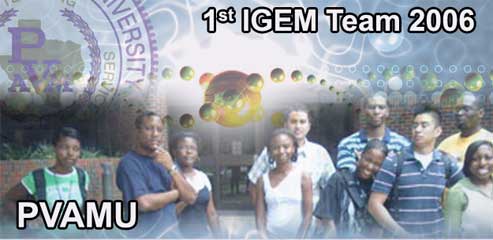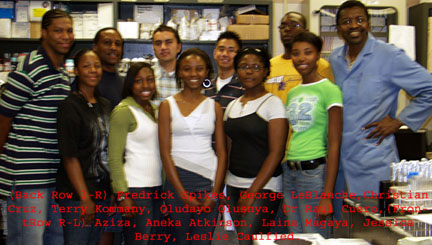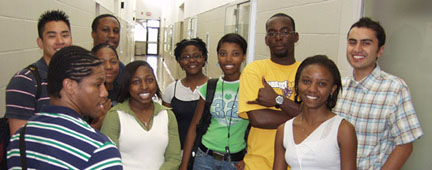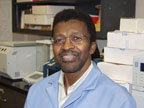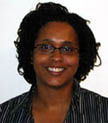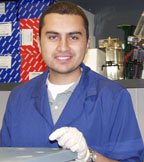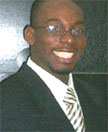Prairie View A&M University 2006
From 2006.igem.org
Contents |
Students
More Group Pictures
Advisors
Dr Raul Cuero,(PhD)
Dr. Raul Cuero, (PhD), Microbiologist, Distinguished Professor.Research Leader, Scientist and Contact Person for Prairie View A&M University iGEM 2006 group. Dr Cuero holds 8 scientific inventions and more than 90 scientific publications.Dr Cuero is currently working on fungal toxins at the molecular level, and on biogenesis. He is also the author of the book "Triumph and Survival".
Email: olimpa@aol.com
www.raulcuerobiotech.com
Dr Harriet Howard-Lee Block
Professor. Area of Interest:Molecular Biology Department Head of Biology
Dr Dierdre Vaden
Dr Vaden's is a Genetics professor and her work is mainly in yeast genetics and phospholipids metabolism.
Dr Huajan Fan
Assistant Professor in Chemistry.
Project
(We have changed the title of our project so many times)
Tri-Metallic Biosensor
Micrococcus luteus strain (ATCC 4698) was transformed by plasmid pUC57-S-3M, in which Fe (II), Ni (II) and V (II) were fused to the fluorescence proteins (ECFP, EYFP, and mRFP respectively and to a fluorescent protein coding region [C0061(lux I)] ligated with a signaling sequence BBa_I13207.
Favorite Biobrick Map(Upcoming)
The pUC57-S-3M was standardized for its specific sensoribility response to three metal ions and to sulfur (S), in order to detect metal contamination and/or hydrocarbons associated to these metals. Single and combination of the tree metals were used at different concentrations (0.2, 2, 50 ppm). The pUC57-S-3M was grown in the presence and absence of oxygen and/or hydrocarbon (Thiophenol). Only results from combined metals are reported. The biosensoribility was determined by the response of the pUC57-S-3M to the different concentrations of the metals. This response was measured by bioluminescence, fluorescence, DNA concentration, bacterial growth. These parameters were related to sensoribility of the pUC57-S-3M.
Parts used
/
/
/
/
/
/
/
/
Favorite Parts/Modified Parts/ Parts By Prairie View
Background
There exists two essential needs which enabled us to design the trimetallic probe. The need for alternative forms of oil, in fact their methods and the bioremediation of metals ions from the environment.
Project Presentation
Project Planning Diary
Calender
May
-Brainstorming and recruiting.
June No entry
July
'August ' -We have been able to isolate a few colonies of transformants of E.coli containing the plasmid 19H (pSB1A2 or BBa I13543). We have been bent on picking up sequences containig lux genes.
September
-So far we have tried to isolate several plasmids but results have not been good. So far we have successfully amplified and isolated 4 plasmids. Well no one will believe how much we got done in such a small amout of time. [Laina's Diary]
October Determined that we will base our sensor on the concentrations of three metals ions, Vanadium, Iron and Nickel,and including elemental sulfur. Our focus is on the DNA expression, determined by luminesence and flourescence.
Student Profiles
#Laina | #Leslie | #Christian
Laina
Laina P. Magaya Graduate student in Chemistry at Prairie View A&M University.Currently working on Microbial Biotechnology applied to the environment at Prairie View A&M University under the Principal Inevstigator Dr R. Cuero. I have also worked in another project where I learnt microbiology techniques , determing the effects of arabinose and glucose on growth of E. coli to determine the expression of ulcer causing agent, Helicobacter pylori at Texas Woman's University. These experiences will nake me suitable candidate for the synthetic biology project with the Prairie View 2006 iGEM team.
Lesli
Lesli Caulfield undergraduate Chemical Engineering senior at Prairie View A&M University in Prairie View, TX. I have carried out research in Biosensors and Cell Adhesion at the University of Oklahoma ( summer of 2003, under Dr. David Schmidtke). I have done research in Characterization of Chiral Sulfoxidation by HRP at the University of Kansas REU (CEBC, summer 20005, under Dr. Aaron Scurto). Currently, I am working on Solid State and Submerged Fermentation Systems at Prairie View A&M-CEBC under Dr. Michael Gyamerah with four of my peers. As one can see, I have a diverse and unique research background. I am interested in Dr. Cuero’s research because it will allow me to not only enhance my research opportunities a bit further, but it will allow the creative side of me to be nurtured and encouraged. Being that he is one of the elite researchers’, I know I will learn a lot and excel in the iGEM team.
Christian
My name is Christian Cruz, I am a graduate student of chemical engineering at Prairie View A&M university. I have been working with Dr. Raul Cuero for the last two years,carrying out experiments related to electrochemistry and now using molecular biology techniques. Now with iGEM 2006 I see a chance for myself to put in practice all of my engineering knowledge and molecular experiences.
Oludayo
Olu is a Senior Biology Major and the SGA president of Prairie View A&M.
Fredrick
My name is Fredrick, a Senior Architecture student at Prairie View A & M University. I had the opportunity to travel overseas and apply all that I've learned at Prairie View. It broaden my views in pursuing other avenues that complimented architecture. I'm looking forward to getting opportunity to venture off after finishing college.
George
George D. LaBlanche, a junior Animal Science major at Prairie View A & M University, is a native Texan of Houston and is now most privileged and occasioned, to investigate an alternative treatment and cure with International Distinguished Professor Dr. Raul G. Cuero Ph.D. We intend to investigate the treatment and cure with regards to Heartworms and other internal parasites; with probable human applications. The potential effect of internal organ regeneration is also also to be studied.
Terry Kommany
Victor Cuero
Victor is a sophomore in Computer Science Major at Prairie A&M university.
References
^ Lovley, DR (2003). "Cleaning up with genomics: applying molecular biology to bioremediation". NATURE REVIEWS. MICROBIOLOGY. 1 (1): 35–44. PMID 15040178.
